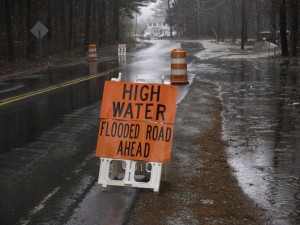
If trends continue, 2014 could tie with 1998 as the hottest year since record keeping began in 1880, according to a recent analysis from the National Oceanic and Atmospheric Administration (NOAA). NOAA reported that year-to-date temperatures for January through September have averaged 1.22°F (.68°C) above the 20th-century average of 57.5°F (14.1°C), making this one of the hottest periods in more than 130 years.
What are the implications for local governments? As discussed recently through a Knowledge Network blog post, “a proactive approach to a locality’s level of risk in the face of natural disasters is not just sensible but also critical and urgent. The proactive approach entails a vulnerability assessment as well as mitigation and adaptation program planning and implementation. Resiliency doesn’t happen overnight, but it can be developed.”
In partnership with a number of federal agencies and other organizations, ICMA has developed a collection of resources designed to help communities become more livable, sustainable, and environmentally resilient. A new ICMA e-brief, Preparing Your (Small) Community for Climate Impacts, by Mary L. Walsh, for example, discusses key concepts and sustainable adaptation techniques, examines several case studies, and offers the latest resources to help local organizations augment their existing disaster plans and adaptation programs. (The e-brief is available through Amazon.com.
Preparing Your (Small) Community provides an “adaptation checklist” that discusses a number of readiness strategies:
- Conduct a vulnerability assessment that looks at every sector of the community, from water and transportation to health and housing.
- Ask key questions to guide the discussions, understand the impacts, and develop policies and programs.
- Bring together stakeholders to engage in the assessment and subsequent planning processes.
- Communicate to all stakeholders the interrelatedness of the health of the environment, economic vitality, and quality of life in the community.
- Fold climate change planning into both your emergency management planning and sustainability programs.
- Plan for both short- and long-term adaptations.
- Prioritize allocation of resources by calculating the probability that a disaster will occur.
- Update flood plain maps, zoning requirements, land use plans, and building codes. The city of Boston’s Checklist for Climate Preparedness and Resiliency offers an example for reviewing new building projects from a climate adaptation perspective.
- Ensure proper training of your public works and emergency management personnel. This training should include the latest in disaster training and PTSD awareness, as well as information about current and future climate impacts for your region, and practical best practices for managing likely impacts.
- Network with other municipalities and managers that have similar concerns. An example of an effective and innovative network of local government managers dealing with the climate issue is the C40 group, a worldwide coalition of local governments that share best practices and support each other’s climate change efforts.
- Be sure appropriate staff members are involved in local associations and coalitions addressing concerns related to extreme weather and disaster management. For example, the Broome-Tioga Stormwater Coalition offers education and resources for its members, as well as for the citizens of these small Central New York State counties that have been hard-hit by unprecedented flooding in 2011.
- Investigate new technologies so that you can be ready to take advantage of innovative and creative products as they become available for adapting to weather extremes and other climate change impacts.
ICMA also has compiled or published a number of resources that focus on ways your community can lower greenhouse gas emissions, improve energy efficiency, utilize solar energy, and grow in smart ways.
- Getting Smart about Climate Change outlines nine strategies for successfully applying smart growth principles to climate concerns on the local and regional levels.
- Breaking New Ground: Promoting Environmental and Energy Programs in Local Government presents findings from the largest study of local government sustainability practices ever conducted. The survey, to which more than 2,000 local governments responded, asked questions regarding sustainability initiatives that have been undertaken by local governments.
- Putting Smart Growth to Work in Rural Communities focuses on smart growth strategies that can help guide growth in rural areas while protecting natural and working lands and preserving the rural character of existing communities.
- Energy Star Case Studies and Resources provides resources to local governments on best practices, news, and other content on the EPA's ENERGY STAR Program that helps communities, businesses, and residents save money and protect the climate through superior energy efficiency.
- Solar Outreach Partnership (SolarOPs) is a program designed to help accelerate solar energy adoption by providing timely and actionable information to local governments. Funded by the U.S. Department of Energy SunShot Initiative, SolarOPs offers local governments a series of educational workshops, peer-to-peer sharing opportunities, research-based reports, and online resources. Contact Emily Dodson at edodson@icma.org for more information about how SolarOps can support you.
To help local governments increase their capacity to recover from disasters, the Federal Emergency Management Association (FEMA) has developed its “Community Recovery Management Toolkit,” a “compilation of guidance, case studies, tools, and training to assist local communities in managing long-term recovery following a disaster.
ICMA’s Center for Sustainable Communities (CSC) staff are available to help local governments develop sustainability plans that can address issues related to climate change. For more information about how they can help your community become more environmentally resilient, visit icma.org/sustainability or contact Andrea Fox, director, Center for Sustainable Communities, at afox@icma.org.
New, Reduced Membership Dues
A new, reduced dues rate is available for CAOs/ACAOs, along with additional discounts for those in smaller communities, has been implemented. Learn more and be sure to join or renew today!
